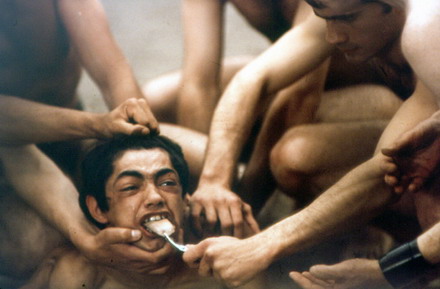Salo: or the 120 Days of Sodom (Pier Paolo Pasolini, 1975): Italy/France
Reviewed by Byron Potau. Viewed on DVD.
 It would be easy to dismiss Pier Paolo Pasolini’s Salo: or the 120 Days of Sodom as disgusting, revolting, and repulsive–all of which it is. And yet, there is something nagging underneath it all. Something this extreme could not possibly be without merit, could it? It must have some redeeming value. Whatever that value may be, for most people, it will not be enough to justify this film.
It would be easy to dismiss Pier Paolo Pasolini’s Salo: or the 120 Days of Sodom as disgusting, revolting, and repulsive–all of which it is. And yet, there is something nagging underneath it all. Something this extreme could not possibly be without merit, could it? It must have some redeeming value. Whatever that value may be, for most people, it will not be enough to justify this film.
Based on a novel by Marquise de Sade and updated to portray Fascist Italy, the film concerns four men (a president, a Duke, a magistrate, and a Bishop) who agree to kidnap nine teenage boys and nine teenage girls, take them to a secluded villa, and submit them to their every whim and desire. “All is good if it’s excessive,” they say. The film begins with the Antechamber of Hell, which includes the kidnapping and the careful selection of the boys and girls. Next the film is divided into circles reminiscent of the structure of Dante’s Inferno, another decent into hell.
The first circle, Circle of Obsessions, has a veteran prostitute telling salacious, pedophilic stories of her youth, intended to arouse the four men to similar acts with their captives. The second circle and most difficult to get through, Circle of Shit, has another prostitute telling of her coprophiliac experiences which inspire unimaginably disgusting encounters with feces. The final circle, Circle of Blood, has the four men indulging in the tortures of their captives.
This film reaches to the depths of depravity to show us the absolute abuse of power. It is not for the faint of heart…or most other people for that matter. Many will not make it past even the first circle, having been put off by the abundant, dehumanizing nudity, homosexuality, and pedophilic moments, as well as the abuses they inspire. This film will test your limits, and I feel confident that many will not pass this test. However, if you are able to make your way through the film you are eventually left with the question, “Why?” Many will feel it was unnecessary to have ever made this film and will dismiss it as trash. Others, perhaps, may discover there is much to contemplate that may only reveal itself in (Gasp!) repeated viewings. Pasolini’s Dante-like structure and very cold cinematography are things of beauty. There is much to discover in the film about humanity and inhumanity, survival, power, instincts, nature, society, domination, submission etc. In a film so full of atrocities and without easy explanations, much is left to be pondered and interpreted. This is a film that, even if I wanted to, I would not feel I could recommend to you. I have given you enough information for you to make your own decision if you want to walk down this path or steer clear of it. I do warn you, though, once you do see this film you will be hard pressed to rid yourself of its images.
DVD Extras: 40 minute documentary The End of Salo, 35 minute documentary with interviews with Pier Paolo Pasolini, Jean Claude Biette, and Nineto Divoli, a short documnetary Fade to Black with interviews with Catherine Breillat, John Maybury, Jear Pierre Gorin, Dante Ferretti, and Bernardo Bertolucci, and theatrical trailer.
2 Comments
Jump to comment form | comments rss [?] | trackback uri [?]